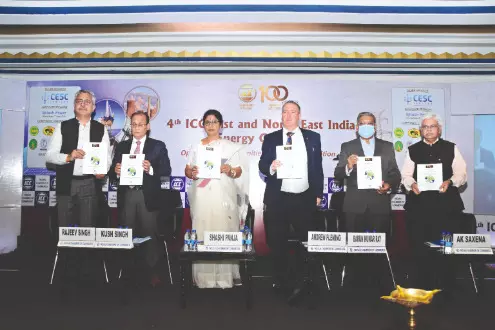‘State exploring underground coal gasification in Deocha Pachami’

Kolkata: State Industry and Commerce minister Shashi Panja said on Thursday that the state government is exploring underground coal gasification in the upcoming Deocha Pachami coal block at Muhammadbazar in Birbhum which is India’s largest and second largest in the world.
Coal gasification is the process of producing syngas — a mixture consisting primarily of carbon monoxide, hydrogen, carbon dioxide, methane and water vapour from coal and water, air and/or oxygen. Natural gas from coal gasification can be cooled until it liquifies for use as a fuel for the transport sector. The state has plans for coal gasification in 30 per cent of the total area of the Deocha Pachami block.
Panja, while highlighting Bengal’s commitment to clean energy and industrial growth by reducing dependence on thermal power at the 4th East and North East India Energy Conclave, organised by Indian Chamber of Commerce (ICC), said that Bengal is proud to be at the forefront of India’s energy transition, driven by clean energy, regional collaboration and innovation. According to Panja, the state has 19,000 MW ground-mounted solar potential with the average tariff dropping to Rs 3 per KW. Hence, solar power is a viable option for meeting the energy demand and sustenance of the environment. About 56 per cent of solar potential in Bengal is concentrated in Purulia, making it an ideal location for large scale solar projects.
“We have potential for floating solar to an extent of 3,567 MW in almost 30 major dams in the state with the Kangsabati dam alone having 1790 MW potential. The biomass potential is estimated at 2,864 MW which is double of the Ministry of New and Renewable Energy’s (MNRE) assessment. The three districts — West Midnapore, South 24-Parganas and East Burdwan — contribute to half of this biomass potential,” said Panja. She added that 20,000 MW of wind energy can be harnessed upto a hub height of 100m above ground length and 23,000 MW upto 150 m above ground level. The minister spoke about the state’s partnership with TERI (Energy and Resources Institute) in unlocking technologies like floating solar, agri-PV, BIPV (Building-Integrated Photovoltaics) and battery storage. “TERI is also helping the West Bengal Transport Corporation with electric bus and ferry storage,” she added. She reiterated that the state is pushing forward with its Green Hydrogen Policy and Renewable Manufacturing Policy to achieve 20 per cent renewable energy by 2030.



